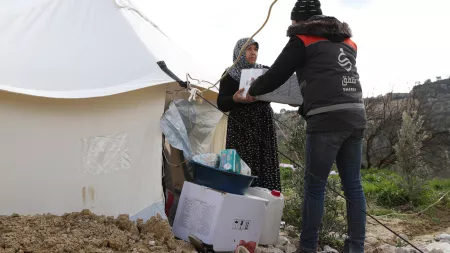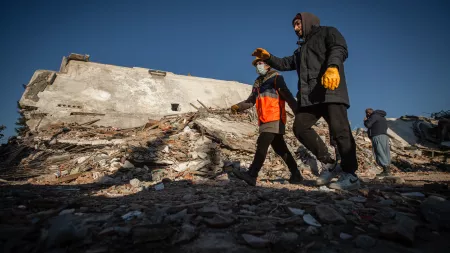Ayham Taha, 33, is a technical advisor for CARE Global on humanitarian food security and livelihoods and works on several projects in Türkiye and Northern Syria. He and his wife are Syrian and have been working in humanitarian aid since the conflict in Syria started. His experiences in the wake of the earthquakes of February 6 are worse than anything he has ever seen. This is how Ayham recounts the last couple of days.
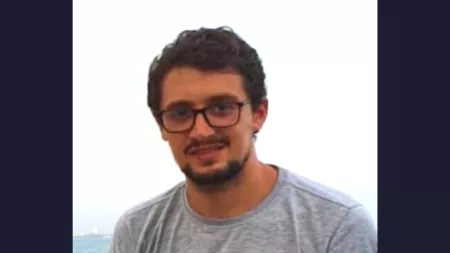
The earthquake
The earthquake hits us at 4:17 a.m. in the morning. I immediately take my wife’s hand, carry my 5-year-old son in my arms and run out of the house as quickly as possible. Everything is shaking, people are screaming. Outside it is cold and dark. We all find it hard to realize what just happened, but I know right away what I have to do. I have practiced this many times before. I have to reach out to my team, but I notice that I do not have my phone. It is still inside the house. Luckily though, a neighbor, who is also outside in the street lets me use his phone.
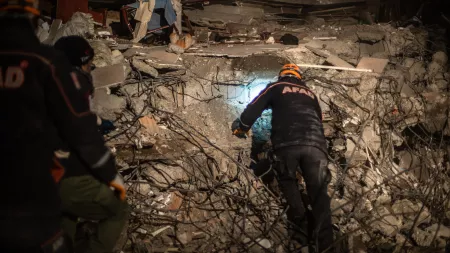
The aftershocks
We cannot go back into our house. The building has small cracks all over. It is not safe to go back inside, because the building could collapse at any time. Through friends, we hear that a collective center is open at my son’s school. But then there are the aftershocks, and I am not sure if the school is stable enough. Nearly every hour there is a new aftershock. There is a lot of panic. My wife and I try to calm our son down and tell him everything is going to be ok. We discuss what the safest option for us is and finally decide to stay in our car – like so many others are doing. It is freezing cold, so we keep our engines running the whole time, to have at least some warmth. I can hardly find any sleep. I am keeping an eye on the gasoline indicator, which is slowly but surely getting lower and lower. Once it is close to being empty, we try to find some more fuel. But the gas stations are crowded with people, desperate to refuel their own vehicles. We wait in line for five to six hours before it is our turn.
The mood in Gaziantep is a mixture of sadness, desperation but also of immense human warmth and solidarity. Many people had to leave their wallets inside the buildings that collapsed after being evacuated. Still, local restaurants help by giving out soup and fruits. People are helping each other survive. I see shopkeepers offering children more food and some chocolate, knowing this might comfort them. After I fill my car’s gasoline tank, I go out to get food for my family. It is amazing to see how people come together to help each other in this way.
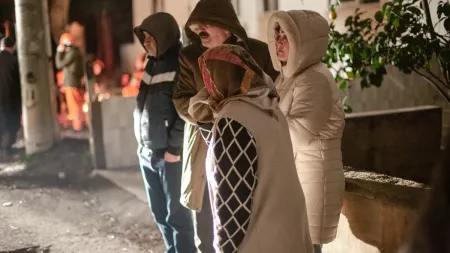
Still the situation remains very difficult. I don’t know how it will continue. How many more aftershocks will hit us and how many buildings will collapse. At this moment we do not know how many people are affected or have lost their lives or a family member and everything they own. I feel exhausted and stressed. I even start smoking – I have never smoked before in my life! But I consider myself to be really lucky: I have not lost anyone close to me.
Finding a safe shelter
I drive slowly, as the roads are severely damaged. We are really scared. There is a lot of traffic, many people are trying to evacuate the city.
I know that my family cannot stay in Gaziantep, so on Thursday, after sleeping in our car for three nights, we leave for Mardin – a city about 200 kilometers east of Gaziantep. This region has been spared the destruction of the earthquake. I drive slowly, as the roads are severely damaged. We are really scared. There is a lot of traffic, many people are trying to evacuate the city. Once we reach Mardin, I find a couple of hotels that are fit for accommodation. I immediately call my manager at CARE and we decide that we will move the rest of the CARE staff here. In the hotel, I sleep for the first time since the earthquake. We are finally safe, and I feel like I can start working again.
Back to work
We set up a makeshift office in the hotel lobby until further decisions are made. People are sitting around with their laptops, eager to organize how we can get the much-needed support to the people who need it the most. We are now prioritizing the delivery of equipment to emergency shelters like tents, mattresses, and blankets. Additionally, we provide food and baby items as well as hygiene and dignity kits to women and girls who are especially affected by this crisis. In Syria there is also a huge need for emergency shelters and as well as food and clean drinking water. We as CARE cannot prevent disasters like that, but we can improve the conditions for the people affected!
